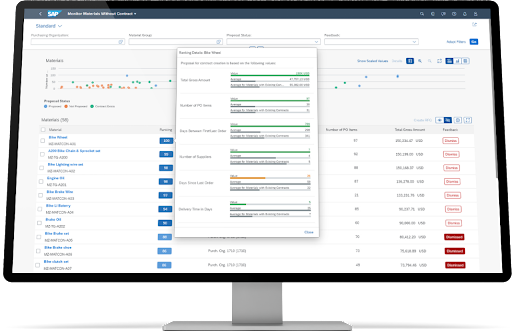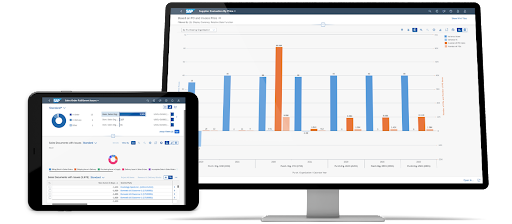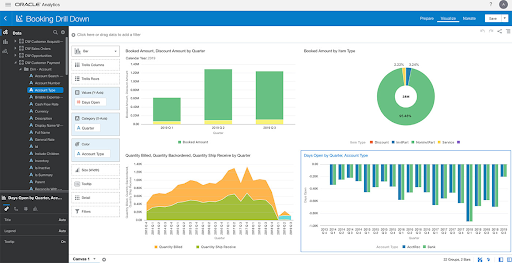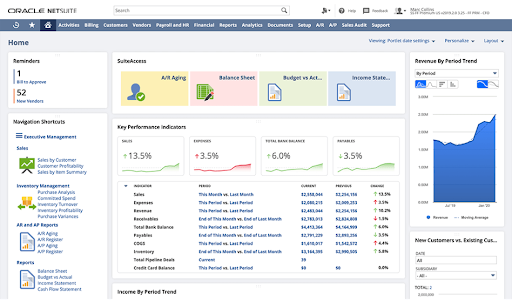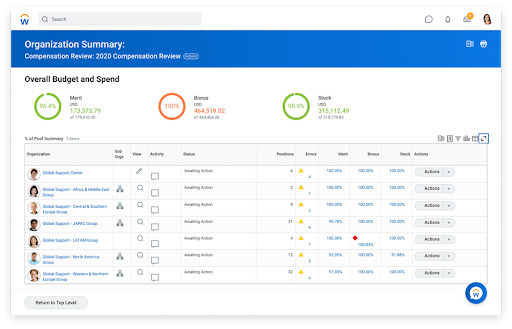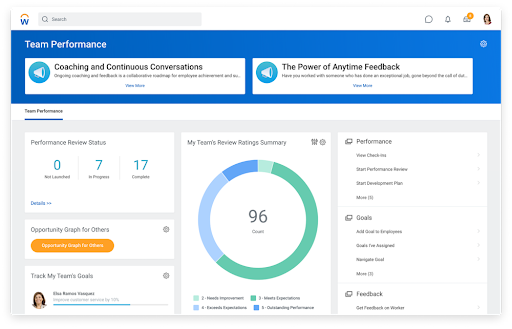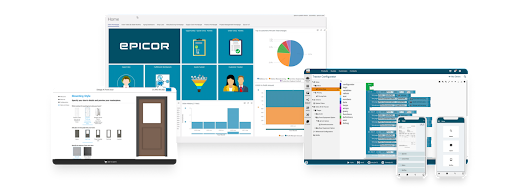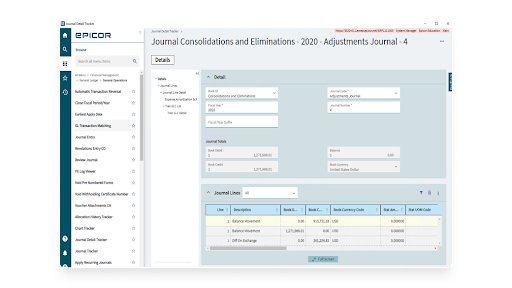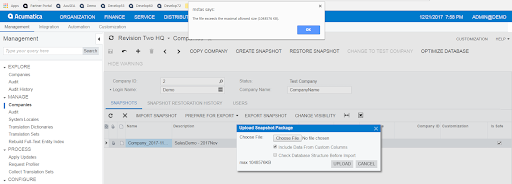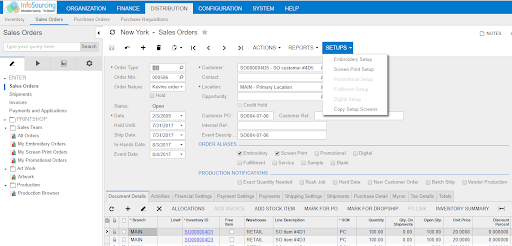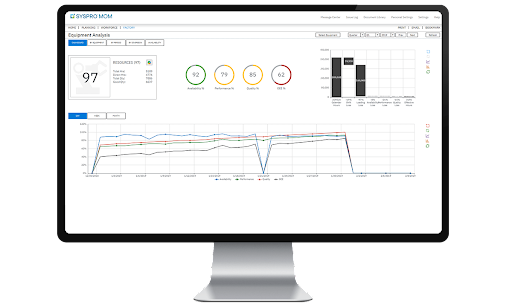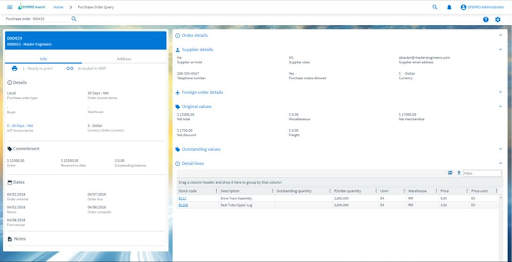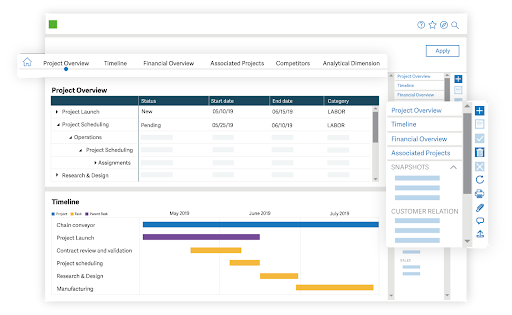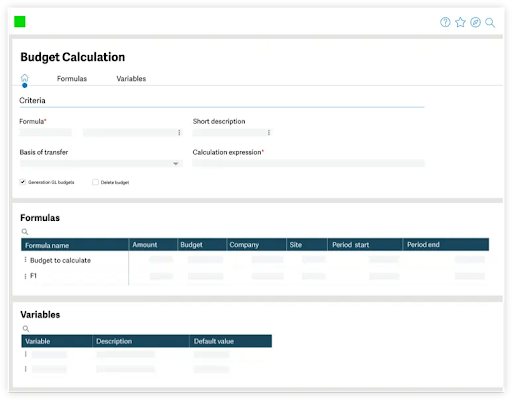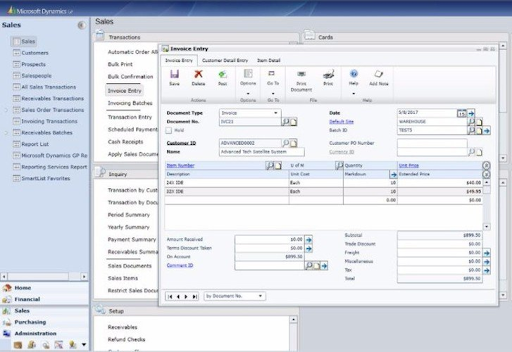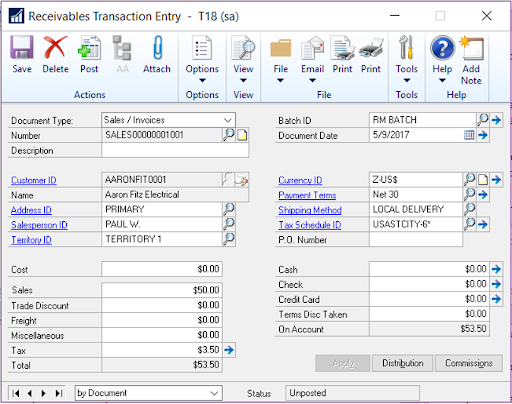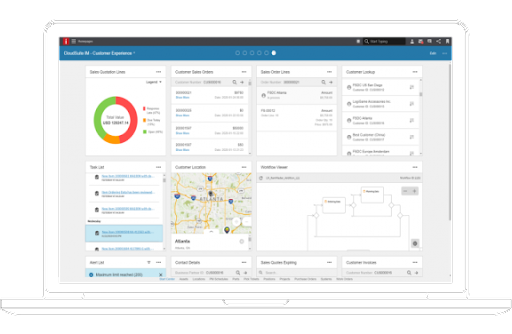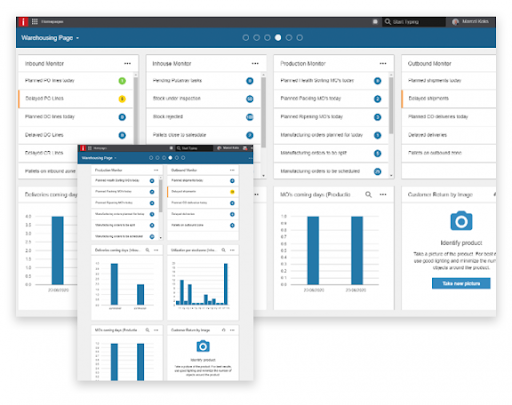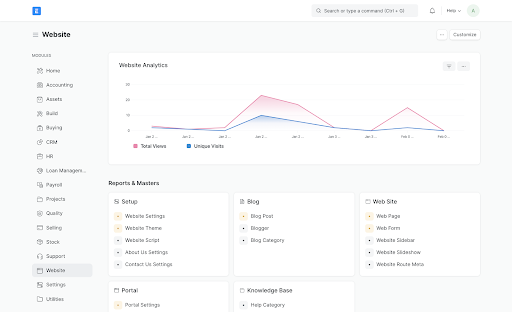With the best ERP software, you can plan your resource management pipeline — from managing HR to bookkeeping and ordering supplies. These tools are designed to make businesses like yours more efficient by streamlining processes and centralizing all your data. With that said, enterprise resource planning solutions are everywhere.
To help you narrow down your options and find the right one for your business and budget, we review each of the market’s top 11 best ERP software solutions in depth to give you everything you need to know to make an informed decision. Let’s get into it.
Our Pick for Best ERP Software: Wrike
- Now that all industries are advancing into AI-based and intelligent software solutions, the best ERP will integrate such features into its design.
- We have given Wrike our top rating for its future-ready perspective, cutting-edge technology, machine-learning capabilities, and tailored solutions.
- Wrike is designed with the needs of the customers, which means you can truly get the most out of your ERP through powerful customization.
Best ERP Software : Top 11 for 2025
We‘ve gathered the top ERP software to help your business run more efficiently. From small businesses to large enterprises, we‘ve got the best of the best for you:
- Wrike – Best ERP Software for Managing Ongoing Projects
- SAP ERP – Perfect for global businesses of all types
- Oracle NetSuite – Best ERP System for financial and supply chain management
- Workday – Perfect system for your human capital management needs
- Kinetic (Epicor) – Best ERP for manufacturers
- Acumatica – Best cloud ERP for businesses that need scalability
- Syspro – Designed for manufacturing and distribution industries
- Sage X3 – Best ERP system for mid-sized businesses
- Microsoft Dynamics GP – Perfectly suited for small businesses
- Infor ERP Suite – Best ERP for the modern industry
- ERPNext – The best open-source ERP software
The term “enterprise resource planning” was coined in 1990 by Gartner — and with it, software like these replaced the painstaking process of building ERP systems on pen and paper.
Forget that — read on. One of these is bound to be the perfect fit for your business.
Best ERP Software – Reviewed
ERP software is a must-have for businesses of all sizes. To help you find the one best suited to your needs, we’ve reviewed each of the market’s leading options in more depth below — including their key features, pricing, and top pros and cons.
1. Wrike – Best ERP Software for Managing Ongoing Projects
Wrike is widely considered one of the most effective Enterprise Resource Platforms available today.
In an age when many businesses allow their employees to work from home, Wrike is the right option for promoting collaboration and improving procedures across a whole company.
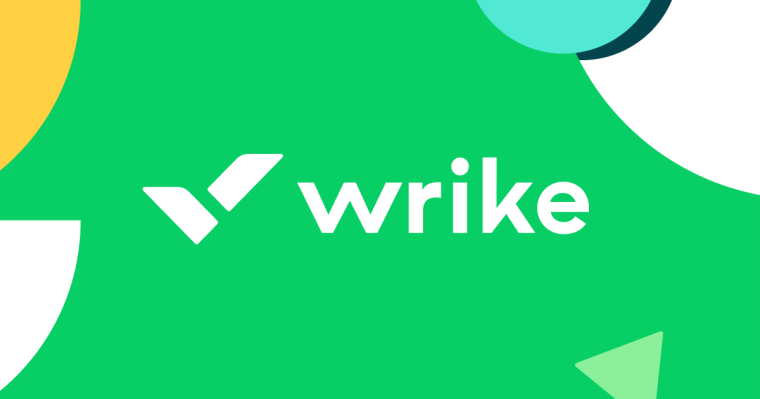
Wrike’s Supply Chain Management feature allows you to monitor your entire supply chain, from raw materials to finished goods, in one place.
This helps you ensure that the right products are being made at the right times and that there are no bottlenecks or issues with getting your products to market.
Business intelligence, or BI, is a powerful feature of Wrike ERP. It’s a vast library of information about every aspect of your business, from sales reports to customer satisfaction surveys.
With BI, you can track the performance of each product, each department, and even each employee.
Pros:
- Can manage both projects and ongoing work
- New intelligent features flag projects at risk of slipping
- Easy to use
Cons:
- Choosing a plan is difficult
- Speed to the data server is bad
| Software | Our Score | Pricing |
| Wrike | ⭐️⭐️⭐️⭐️⭐️ | $24.80 per user a month for professional |
2. SAP ERP – Perfect for Global Businesses of All Types
SAP’s ERP software system can be used for various applications, including planning demand and supply chain management. It’s also fantastic inventory management software.
As an all-inclusive package, it offers businesses one centralized view of their operations. With SAP S/4HANA Cloud, your business can be transformed by intelligent automation.
The cloud-based ERP system is designed with a future-ready perspective; it’s built on cutting-edge technology with AI, machine learning, and advanced analytics, all of which offer more significant insights into data than ever before.
One factor that makes this service stand out from other options is its large scope of operations. It has been deployed across industries worldwide, making it an ideal solution no matter what type of operation you run.
As a bonus, SAP’s system is already tailored to meet customers’ specific needs to be adapted quickly and easily without the need for time-consuming customization.
The cloud ERP applications from SAP are designed with your needs in mind. Whether you want to customize processes or use the public or private sector offerings for flexibility purposes, SAP will be able to accommodate all of these requirements and more.
Pros:
- End-to-end process automation
- Multiple language and currency options
- Easy to generate statistical highlights
- Integrated cloud applications
Cons:
- Complex UI
- Costly subscription
| Software | Our Score | Pricing |
| SAP ERP | ⭐⭐⭐⭐⭐ | Starts at $56 per user/month |
3. Oracle NetSuite – Best ERP System for Financial and Supply Chain Management
NetSuite is a cloud-based service where clients can buy separate modules as needed. This is good news for those who want to upgrade or downgrade their packages as business needs change.
Plus, there are no setup fees; you pay only for what you use as you go and then stop using the services whenever you want to.
You can manage your accounting, order processing, inventory and warehousing, manufacturing, marketing, and customer service all from one convenient place. NetSuite is highly customizable, so you can design a solution that works perfectly for your business.
The user interface of NetSuite is more streamlined than some other ERP options. Everything on the screen is visible at once instead of being split across multiple windows like other software packages.
This makes it easier to use during those first few days before employees have memorized their way around the system. Best of all? You can access NetSuite from any computer or mobile device anywhere in the world.
Unlike traditional systems, which require employees to be on-site to make changes, NetSuite can be updated remotely – whether you’re at home or halfway around the globe. This saves employees valuable time and makes your business more efficient.

Pros:
- No setup fees
- Cloud hosted
- Extremely customizable
- Offers remote function
Cons:
- Complex reporting and management
- Above average price/li>
| Software | Our Score | Pricing |
| NetSuite | ⭐⭐⭐⭐ | $499.00 /month |
4. Workday – Perfect System for Your Human Capital Management Needs
Workday is another ERP service that isn’t an actual piece of software. Instead, it’s a cloud-based platform where you can purchase different modules. The core Workday package includes accounting, payroll, and human resources.
You can add to this by getting additional modules for project management, customer support, reporting, or security which you can subscribe to on an ongoing basis. The user interface of Workday is also well-designed and easy to use, even for newcomers.
This makes it easier than ever for employees who are just starting with your business to be productive right away instead of having to figure out the system over time.
Workday’s HR software helps businesses and their employees be more productive by providing an overview of your company’s performance.
From this, the human resources team can make critical decisions that will affect how well both are doing overall in terms of resource management, setting you up for success now and into the future.
Key Performance Indicators
Today, employee and company performance tracking is usually done using key performance indicators (KPIs). Almost every ERP platform tracks KPIs because of their pivotal nature in determining company success. KPIs include metrics like customer acquisition cost (CAC), revenue per employee (RPE), and more!
Workday offers a unique blend of benefits for both employees and employers. Employees can expect training modules to help them grow within a company rather than simply staying in the same position over time.
Employers, meanwhile, get perks, including “hire-to-retire” technology that helps attract and retain the best people possible while also making sure that everyone is onboarded quickly and ready to go from day one.
Pros
Cons
Kinetic, formerly known as Epicor, is a SaaS ERP solution for small to mid-sized manufacturers. The software is a streamlined and straightforward interface that makes it easy for employees at any level of experience to find the tools they need right away without reading up on complicated manuals first. With Kinetic, you can choose to deploy the solution in a cloud or on-premises. As an all-encompassing manufacturing management system, it is uniquely positioned to manage various industries’ requirements with one platform. Kinetic allows you to integrate social-network-style communication between employees so that everyone is always aware of what’s happening in the business. It also makes it easy to communicate with your global team using the same platform, regardless of whether the communication is happening domestically, regionally, or internationally. This platform also gives B2B buyers a business-to-customer experience using its community module. It helps you to improve your relationship with customers and prospects by easily managing contacts, leads, and customers from any device. Acumatica is a cloud-based ERP solution that offers all the features and functions your business will need to succeed without requiring any costly onsite servers. It works with existing information systems to support departments’ transactions, operations, and reporting. This system also comes equipped with a valuable set of tools. Managers can use these at different levels in the organization depending on their job responsibilities, so they have access only to what is needed for their work. Additionally, Acumatica can integrate seamlessly with other software programs you use – so there’s no need to write lengthy custom code or retrain your employees to switch over. When it comes to managing your company’s modern, integrated business operations, Acumatica has you covered. From financials and distribution through manufacturing, retail e-commerce, project accounting, and field services CRM, they cater to all business aspects. With Acumatica ERP, you’ll get all the benefits of an online system with none of the hassle or downtime. This can save your company time and money by reducing the workload of maintaining essential financial records in person. SYSPRO is designed for manufacturing and distribution enterprises, helping them scale and accommodate their growing businesses. Its solution is particularly efficient at streamlining processes, which assists you in getting orders out the door and into your customer’s hands. That way, you can focus on your core business and leave the administrative hassle to SYSPRO. This system works with multiple inventory types, allowing you to keep track of raw materials, goods in process, finished goods, work-in-progress, or spare parts, all from one interface. You can also check on product availability before placing an order, ensuring nothing will be left behind. SYSPRO uses specially designed metrics based on industry best practices to help monitor performance among departments throughout your company, giving managers a complete view of what makes their teams thrive. SYSPRO’s flexible manufacturing solutions are designed to meet your needs no matter what process you use. Its custom models for each type of environment can provide the right solution at a competitive price point. Sage X3 is an integrated business management software suite that has been thoroughly tested on a wide range of businesses and optimized to ensure success. It lets you control your cash flow, finance, and accounting operations while streamlining production and boosting sales. This ERP solution comes packed with features that improve decision-making capabilities, industry-specific functionality, mobile banking capabilities, and inventory management, among other things. Sage X3 is a mid-sized company’s dream come true. It has all the functionality of ERP without being too expensive or complicated to implement, making it perfect for companies with smaller needs in mind – particularly manufacturers and distributors that want big business functions without paying an exorbitant price tag. Sage X3 offers everything from sales and marketing plans right down to inventory management, giving you complete control over your entire supply chain process. As the world’s preferred small business management solution, Microsoft Dynamics GP offers organizations around the globe a scalable yet flexible platform that ensures they are prepared for change. The system allows businesses to pick what they want out of their ERP software while leaving room for future growth. Once deployed, everyone involved with operations will have one centralized resource that gives them access to everything from inventory levels to customer orders. This central access to crucial information makes running the company faster and more efficient. On the whole, Microsoft Dynamics GP is a comprehensive system for managing all aspects of your business. It has applications in financial management, human resource management, manufacturing planning, supply chain management, etc., with hundreds available from ISVs or individually. Dynamics GP is a powerful and intuitive system that leverages Microsoft’s Windows/NET frameworks. The on-site deployment can be opted for, or it’s possible to host this software with monthly fees provided by the company in exchange for benefits such as online training and support. Infor offers a traditional ERP software system – but with an innovative twist. Instead of forcing businesses to use everything once or nothing at all, Infor lets you pick out specific solutions for your business needs today while also leaving room to add other functionality down the road when you need it. Infor ERP includes a built-in artificial intelligence (AI) platform for business intelligence. The Infor Coleman product integrates with cloud suites to provide robotic process automation (RPA), which refers to automated tasks alongside human employees rather than replacing them in their roles. This means improved efficiency as well as increased productivity. Additionally, there are digital assistant voice capabilities through natural language processing (NLP). With Infor cloud ERP solutions, companies can experience the benefits of industry-specific functionality without extensive customizations or integrations. The company’s sensitive business applications are automatically upgraded to take advantage of modern advancements and growth opportunities with little effort on your behalf. This system also has a clean, simple interface that’s easy to navigate, even for those who aren’t tech-savvy. Plus, it can be accessed via any computer or mobile device, making working remotely just as easy as being in the office. The ERPNext open-source enterprise resource system is an excellent option for those who need an easy and interactive solution. It’s simpler to maintain, which means you can customize your experience with it more than most other systems on the market will allow. Unlike traditional commercial off-the-shelf software, ERPNext is an open-source technology, meaning that they provide the code to people who implement this system. You can modify how things work without having deep technical expertise or knowledge about enterprise resource planning systems in general. ERP systems cannot always do this efficiently; however, with its proprietary artificial intelligence (AI) algorithm technology, ERPNext can provide an expanded feature set without compromising performance or flexibility. This means you can get all your business-critical tasks done more quickly. The company’s latest update allows organizations like defense contractors, who need complex processes for managing projects on an international scale (that may involve collaborations across different nationalities), to find relief using this toolkit. It’s designed specifically to help such businesses thrive today. Today, there’s an app to serve every business purpose. Not just one, but hundreds of software platforms exist for each company goal or need, and ERP software is no exception (as seen through the many options we just explored). So, how do you choose the right ERP software for your business? There are a few handy factors you should consider when making your decision. Look for the following characteristics, as these will be indicative of a good match for your business: The scalability of your ERP software is essential as your company will grow and change over time. You need an ERP that can grow with you. NetSuite and Infor are both scalable options in our list, but you’ll find that most ERP software is scalable to some degree. The best ERP software solutions are those that have been designed to work with the way your company does business rather than forcing you to change the way you do things. This is one of the advantages of custom-built ERP software – it can be tailored to fit your specific needs. However, this is not always possible or affordable, so you’ll need to do your research to find an ERP that is a good fit for your business processes. Your employees will be using the ERP software daily, so it’s important that the interface is user-friendly and easy to learn. Our reviews found that most ERP software solutions have user-friendly interfaces, but some are easier to use than others. Look for an ERP that has a simple and intuitive interface. The best ERP software solutions offer a wide range of features to meet the needs of your business. Not all ERPs offer the same features, which is why it’s essential to compare them before making your decision. The features you require will depend on the size and type of your business, so make sure you consider all of your needs when looking for an ERP solution. In the 1960s, the manufacturing industry was booming, but businesses needed a way to manage the resources and data across different departments. Individual business owners created MRP systems according to the specific setup of their manufacturing business to deal with this issue. ERP software is the evolution of MRP systems designed to manage resources and data across an entire organization. It can handle everything from accounting and inventory management to human resources and customer relations. ERP software integrates all these functions into a single system, allowing businesses to manage their resources more effectively and make better decisions. ERP’s historical predecessor: MRP ERP software generally includes the following key features: ERP software work by integrating all the company departments into one system and presenting them with a clear view of the entire organization. This allows for better decision-making and more efficient and coordinated operations. Running a business, whether large-scale or small, isn’t an easy task. There are so many moving parts and pieces that need to be managed for the company to be successful. This is why business owners need to have enterprise resource planning (ERP) software. There are several key benefits to using ERP software: Where once ERP was used for larger-scale companies only, like manufacturing and distribution, ERP software is now becoming more commonplace in small- to medium-sized businesses (SMBs). As technology advances and business needs change, so too must ERP software. Nowadays, there are a variety of ERP software packages on the market that are customizable for different industries, such as retail, healthcare, construction, and more. So, how do you know which ERP software is best for your specific business needs? Here’s a look at some of the most popular ERP software options and what they’re best suited for: Microsoft Dynamics 365 Oracle NetSuite SAP ERP Infor ERP If you’re looking for the best ERP software for your specific business needs, it’s important to do your research and find the system that fits you best. Despite the immense benefits of using ERP software, not all businesses require it. Most businesses can last 6-7 years just using their systems. So, when does it make sense for a company to invest in ERP software? The answer largely depends on the size and complexity of the company, but generally, ERP software should be considered whenever a business experiences any of the following: Let’s take a look at some of the main points that businesses should review before purchasing ERP software: ERP software provides a comprehensive view of an organization’s operations, but what if you need to access that information on the go? A mobile ERP solution gives you the power to manage your business anywhere, anytime. Mobile ERP is designed for users who need to access their data and perform transactions away from their desks. It can be used on a smartphone or tablet, making it perfect for business owners who are always on the go. Some great ERP solutions that offer mobile access include Sage 50cloud, Infor ION, and Microsoft Dynamics 365, but many others are available. When looking for the best ERP software, it’s important to consider the current trends in this field. Let’s look at some of the most popular trends in ERP today: The bottom line is that finding the best ERP for your business may take some time and effort, but it’s well worth your while. This is because every ERP is different and offers specific features for various uses. Here’s a recap of our top 11 picks: Our pick for the all-around best ERP software is Wrike for its use of intelligent design and machine learning. It covers all the bases, and what’s more, it allows businesses to completely customize their ERP experience with tailored solutions to suit their needs.
Software
Our Score
Pricing
Workday
⭐⭐⭐⭐
Visit Workday for pricing
5. Kinetic (Epicor) – Best ERP for Manufacturers
Pros:
Cons:
Software
Our Score
Pricing
Kinetic
⭐⭐⭐⭐
Visit Kinetic for pricing
6. Acumatica – Best Cloud ERP for Businesses That Need Scalability
Pros
Cons
Software
Our Score
Pricing
Acumatica ERP
⭐⭐⭐⭐
Contact Acumatica for pricing
7. SYSPRO – Designed for Manufacturing and Distribution Industries
Pros
Cons
Software
Our Score
Pricing
SYSPRO
⭐⭐⭐⭐
Contact SYSPRO for pricing
8. Sage X3 – Best ERP System for Mid-Sized Businesses
Pros
Cons
Software
Our Score
Pricing
Sage X3
⭐⭐⭐⭐
Visit Sage X3 for pricing
9. Microsoft Dynamic GP- Perfectly Suited for Small Business
Pros
Cons
Software
Our Score
Pricing
Microsoft Dynamics GP
⭐⭐⭐⭐
$100/user per month for Premium
10. Infor ERP Suite – Best ERP for the Modern Industry
Pros
Cons
Software
Our Score
Pricing
Infor ERP
⭐⭐⭐⭐
The price depends on the version. Visit Infor ERP for pricing.
11. ERPNext – The Best Open-Source ERP Software
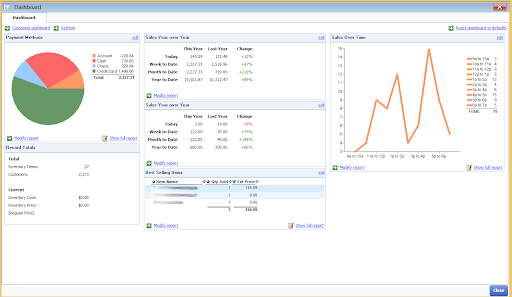
Pros
Cons
Software
Our Score
Pricing
ERPNext
⭐⭐⭐⭐
$50/user per month
Which Type of ERP Software is Right for You?
An ERP Solution That’s Scalable
A Good Fit With Your Company’s Business Processes
A User-Friendly Interface
A Comprehensive Feature Set
What is Enterprise Resource Planning (ERP)?
Because of their focus on efficiency and tracking, the first systematic approach to resource planning was actually invented in a factory in the 1960s. This approach was termed Materials Requirements Planning (MRP) and concerned itself primarily with tracking the quantities and availabilities of raw goods that were to be turned into valuable products. Today, most ERP systems track everything MRP used to, as well as non-manufacturing related quantities (like the KPIs we mentioned earlier).What Are the parts of Enterprise Resource Planning ERP?
The Benefits of Enterprise Resource Planning Software
ERP Software for Different Industries
Best for: SMBs in a wide range of industries, including retail, healthcare, construction, and more.
Best for: Companies in the retail, wholesale, and distribution industries.
Best for: Larger companies in a wide range of industries, including manufacturing, distribution, and more.
Best for: Companies in the automotive, aerospace, and defense industries.When it Makes Sense to Invest in ERP
Considerations When Purchasing Enterprise Resource Planning Software
Mobile ERP: What Are They?
Current ERP Trends to Watch
Conclusion: What’s the Best ERP Software for 2025?
FAQs
What Is Enterprise Resource Planning (ERP)?
What can I expect from using an ERP system?
What are the differences between ERP and MRP?
What are the key features of ERP?
What are the benefits of using an ERP system?
How much does ERP software cost?
Which ERP is best for my business?
What are the different types of ERP software?
Which database is best for an ERP system?
Read More:
